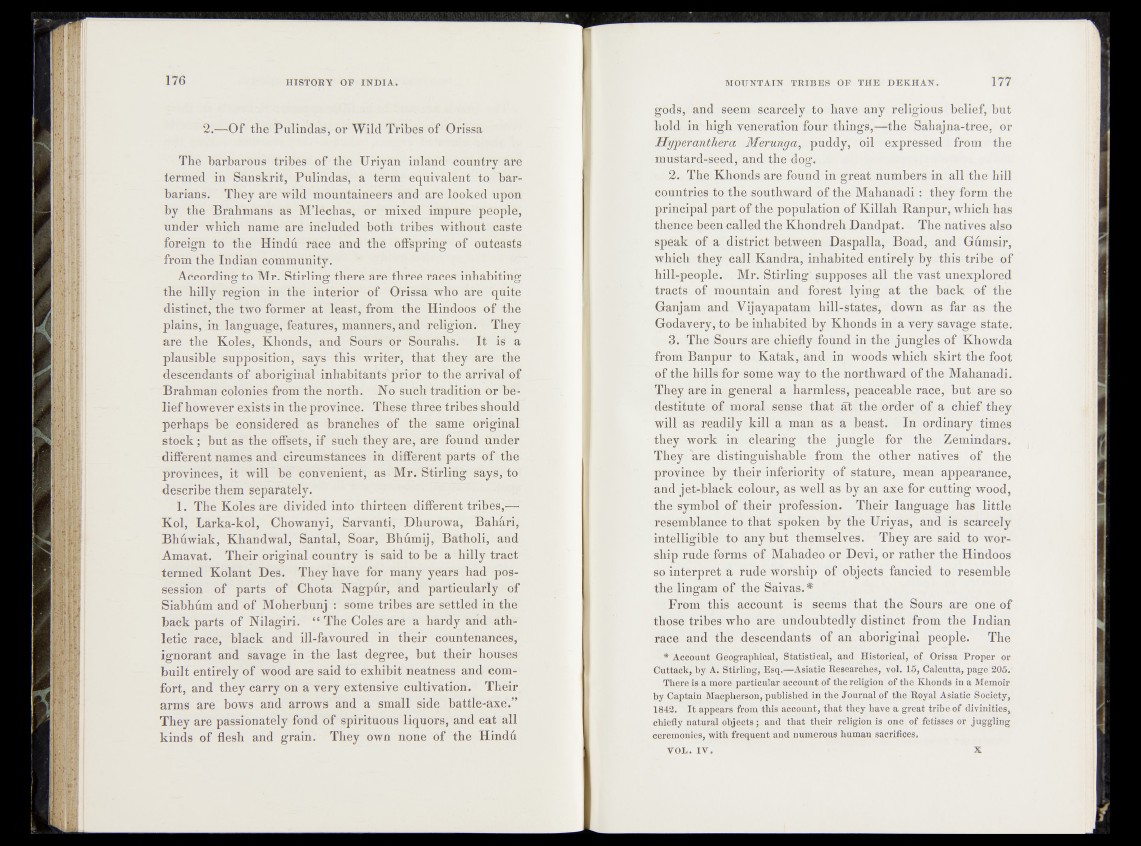
2.—Of tïié Pulindas, or Wild Tribes of Orissa
The barbarous1 tribes of the Uriyan inland* country are
termedS'fh Sanskrit, Pulindas, a '%Tm equivalent to -barbarians.
They are wild mountaineers and are lOo;ked%pon
by the Brahmahs as M’lèchas, or mixed impure people,
under which name are included both ttd^i^%ithoufr ieafète
foreign to the Hindfr race and thé * offspring of outcasts
froin the Indian community.
According to Mr. Stirling there are three races inhabiting
the hilly region in the interior of Orissa- who are quith
distinct, the two former at least, from the Hindoos of-the
plains, iiL language, features, manners, and religioiK They
are the K o l^ Khonds,- and Sours or “Sourahs. 1$' is' a
plausible supposition, says this.’ writer, that they^lfeS? the
descendants of aboriginal inhabitants^prior' to the arrival d£
Brahman colonies from the north. No such tradition or belief
however exists in the province. These three tnibésishould
perhaps be considered as branches of the same original
stock; but as the offsets, if such they'are, are foiih# under
different names and circumstances in different parts the
provinces, it will be convenient, as-Mr. Stirling says,to
describe them separately.
l i The Koles are divided into thirteen* different trib e s,^
Kol, Larka-kol, Chowanyi, Sarvanti, Dhurowa, Bahhriy
Bhuwiak, Khandwal, Santal, Soar, Bhümij, Bètholi, and
Amavat. Their original country is said to be a hilly tract;
termed Kolant Des. They have for many years had possession
of parts of Chota Nagpdr, and particularly of
Siabhdm and of Moherbunj some tribes are settled M the
back parts of Nilagiri.' “ The Coles are a hardy and athletic
race, black and ill-favoured in their countenances,
ignorant and savage in the last degree, but their houses
built entirely of wood are said to exhibit neatness and comfort,
and they carry on a very extensive cultivation. Their,
arms are bows and arrows and a small side battle-axe.”
They are passionately fond of spirituous liquors, and eat all
kinds of flesh and grain. They own none of the Hindti
gods, and seem, scarcely to have any religious belief, but
•hold- in high veneration four things,-—■the Sahajna-tree, or
«puddy, oil expressed from the
■ 'lpustard-seed,. and the dog/ t-
The Khonds aréffound in great numbers in all the hill
countries to'the/Southward of the Mahanadi: they form the
principal part offthe population of Killah Ranpur, which has
then0^ e 5sn>jcalled thè-Khondreh Dandpat. The natives also
speak of a district between* Daspailatf^ Boad, and Gumsir,
which'they- call Kandra, inhabited entirely by this tribe of
hill-peophlg§ Mr. supposes all feEe vast unexplored
tracts of mountain and. feregfe lying at .the back of the
Ganjam and.Vijayapatam hill-states, down as far as the
Godaveryftoi bei|#habited by Khonds in a very savage state.
3. The >§eurs are chiefly found-amthe, jungles of Khowda
from Banpur to Katak, and in woods which skirt the foot
of the hill# for some way to the northward of .the Mahanadi.
They are-in general U harmless, peaceable race, but are so
destitutor of moral, sense that at the^order of a chief they
will as readily 'kill a man-as a beast. In ordinary times
they work in clearing the jungle for "the; Zemindars.
They hre distinguishable from the other natives of the
pro.viiÉeej.,by their inferiority, of stature, mean appearance,
and jet-black colour, as well as by an axe. for cutting wood,
the symbol of their profession. Their language has little
resemblance to that spoken by the Uriyas, and is scarcely
intelligible to any but themselves. • They are said to worship
rude forms of Mahadeo or Devi, or rather the Hindoos
so interpret a rude worship of objects fancied to resemble
the lingam of theSaivas.*
From this account is seems that the Sours are one of
those tribes who are undoubtedly distinct from the Indian
race and the descendants of an aboriginal people. The
* Account Geographical, Statistical, and Historical, of Orissa Proper or
Cuttack, by A. Stirling, Esq.—Asiatic Researches, vol. 15, Calcutta, page 205/
There is a more particular account of the religion of the Khonds in a Memoir
by. Captain Macpherson, published in the Journal of the Royal Asiatic Society,
1842. It appears from this account, that they have a great tribe of divinities,
chiefly natural objects; and that their religion is one o f fetisses or juggling
ceremonies, with frequent and numerous human sacrifices.
VOL. IV. X